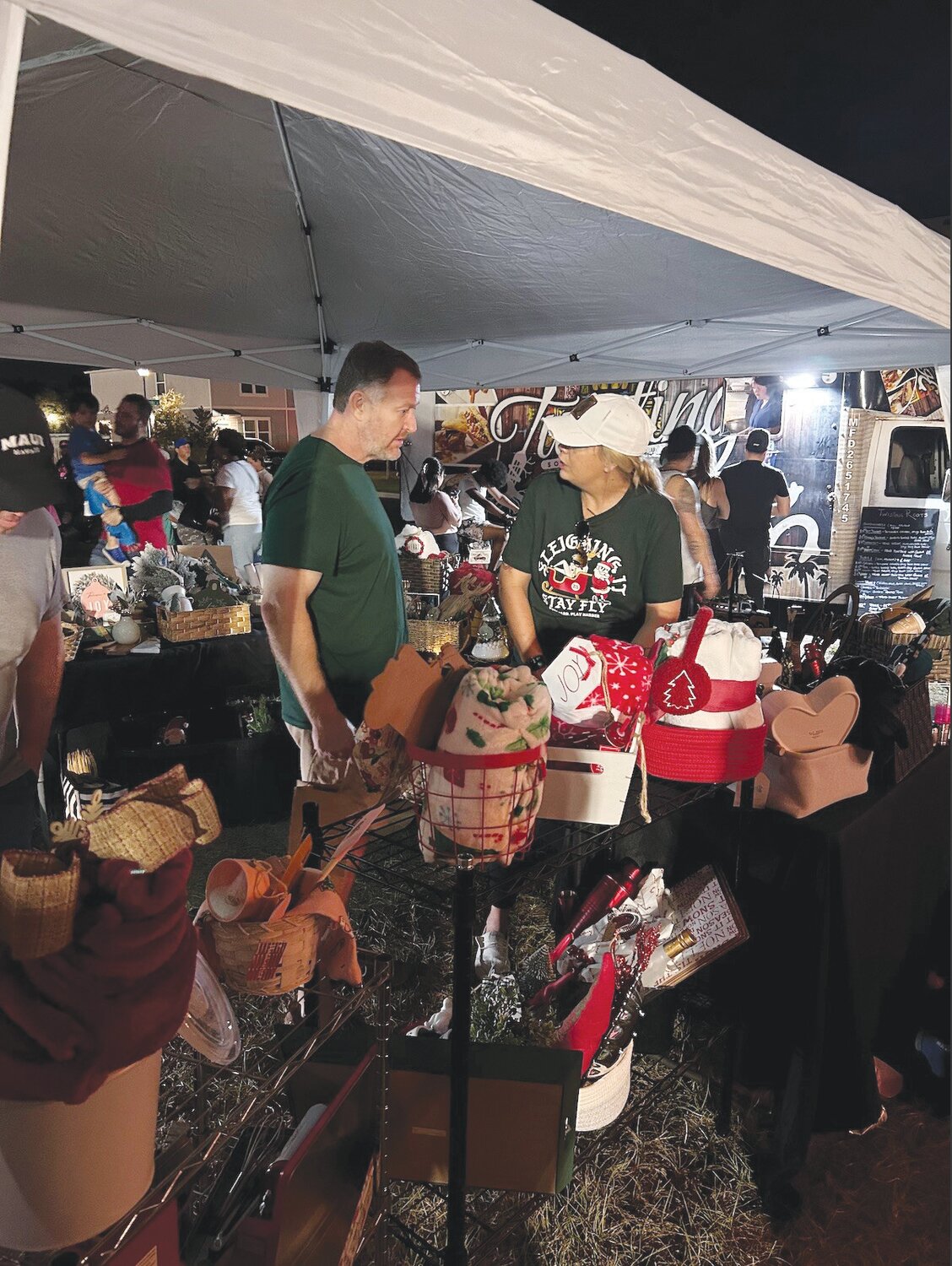‘Just pay attention’ Local businesses warn of pervasive online scams
CLAY COUNTY – In a bustling world of small businesses in Clay County, four entrepreneurs from diverse backgrounds converged to tell their stories of a common concern: online and social media scams.
…
This item is available in full to subscribers.
Attention subscribers
To continue reading, you will need to either log in to your subscriber account, below, or purchase a new subscription.
Please log in to continueDon't have an ID?Print subscribersIf you're a print subscriber, but do not yet have an online account, click here to create one. Non-subscribersClick here to see your options for subscribing. Single day passYou also have the option of purchasing 24 hours of access, for $1.00. Click here to purchase a single day pass. |
‘Just pay attention’ Local businesses warn of pervasive online scams
CLAY COUNTY – In a bustling world of small businesses in Clay County, four entrepreneurs from diverse backgrounds converged to tell their stories of a common concern: online and social media scams.
Sept. 11 was a joyous day for Danielle Walton. After two months of preparation, she was finally ready to open her small business in Oakleaf, Marley’s Markets, which creates baskets, trays, and bins with decor items and markets them to real estate companies.
She found out she had to pay to network on Facebook, a crucial aspect of her business, to register for pop-up local vendor events in Clay and surrounding counties.
It was a scam.
Walton learned scrupulous scammers duplicated social media pages to lull unsuspecting victims into making payments for bogus services.
Scammers posed as event agents or organizers. They contacted her and other vendors with event flyers through emails, text messages and comments and messages on social media. The fraudsters typically focus on Facebook, creating duplicate event pages and sometimes creating flyers that go out into the community.
“When you sign up to be a vendor, the (event planner or agent) reaches out to you, or you can reach out to them. They email you a (event) link to (gauge your interest), and then they try to send you a flier,” Walton said.
Fraudulent communications are often conducted online through doctored fliers and duplicate event pages, where scammers pose as a legitimate business. Scammers have already replicated events like Local Fest Duval. One red flag to watch: if two pages exist for the same event on social media. If the former has 1,000 followers and the other has 60, the smaller one is likely the scam.
An important overarching factor to consider is the person’s name running the page, which the scammers typically do not use.
“It’s crazy. You have to look out for yourself. Pay attention to the name,” Walton said.
“Sometimes, you just have to “go with what you know.”
Organizers like Rebecca Fixel of First Coast Vendor Village is considered a trusted source. Her organization is a measuring stick between strong, reliable local businesses and fraudulent, fake and bogus claims generated on social media accounts and email accounts.
Time is money; the painstaking process has wasted much of Walton’s time.
“Each time I get (a claim), I probably spend about 20-to-30 minutes investigating each one to make sure they are real,” she said.
Walton recounted when a church event demanded an upfront $60 fee. She spent so much time verifying the authenticity, which distracted her business.
It’s not just a business world problem. It’s a community problem. And that’s where the majority of Walton’s worries lie.
“It’s really (just part of everyday life), nowadays. You just have to make sure it’s not a scam anymore. That’s how people are making their money. You have to check and make sure people are not taking advantage of you,” she said.
Scams have become so pervasive she has adopted a constant, skeptical mindset.
“I (consider) everything as a scam first. That’s the way I get through it. Don’t click on anything without me looking at it,” Walton said.
Nobody is safe, but seniors are particularly at risk. She worries about her father.
“I worry about my dad and the older generation. If it’s easy for people my age to get scammed, imagine how much easier it is for them to fall for it,” she said.
Fixel’s First Coast Vendor Village operates a legitimate service in a growing and high-confusing industry.
Her company is a traveling local small business pop-up that appears in subdivisions and Home Owner’s Association communities. Her events include a food truck, a sweet treat vendor and several small pop-up shops that offer artisan crafts and other items.
Fixel utilizes flyers, targeted marketing, yard signs and social media to run her business. She also works with management in each community. First Coast Vendor Village charges $50 for each vendor. She has some properties on one-to-four-month rotations and adds new communities “all the time.” With 13 years of experience, she is the sole organizer of Local Fest Duval.
Fixel is concerned because scammers do many of the same things she does. The primary difference is that their actions are illegal. The fraudsters post duplicate event pages and ask residents to pay vendor fees. The scammers are often far away from the event, working from a computer room in a foreign country to target unsuspecting vendors.
Fixel spends several hours monitoring her event pages, a daily task impossible to complete.
Time is money, and the scammers take that away. She identifies scams on her own time, which distracts from her business.
“Even though I monitor it and have to approve posts on my Facebook event pages, comments can come from anywhere,” she said.
Anonymous scammers have posed as First Coast Vendor Village. They claim vendor spots are still available for her events. Then, they ask for upfront payments via bogus links. The fraudsters then request vendors to send their email addresses on Facebook Messenger. Victims are directed to a fake link for the transaction.
“I just delete, block, report, and delete. I just deleted four different bot accounts, saying, ‘We still have room at this event for you,’” she said.
She is frustrated Facebook has been unresponsive to the reported scams.
She takes proactive measures to avoid being duped. Fixel includes disclaimers in every post, clarifying she is the only admin for the event, telling clients: “Please block and report anybody claiming otherwise.”
But the scammers still find a way to slip through the cracks.
Vendors call her to ask questions after they’ve fallen victim to a scam. They all believed they were dealing directly with First Coast Vendor Village.
“That’s not me. I’m not working with anyone else,” she said. The scammers’ tactics include photos of unsuspecting individuals, where they often write with broken English, potentially indicating a foreign origin. “It could be a picture of you, a grandmother from Minnesota. This has wasted a ton of my time.”
Scammers avoid using her name, which is the best way to know if you’re being targeted for a rip-off, Walton and Fixel said.
Fixel said fraudsters had damaged her company’s reputation.
Orange Park’s Nailed It Residential Services is a small business that has specialized in renovations and remodels for more than eight years. It’s owned by Danielle Walton’s husband, Mike Langtry. While they don’t share the same last name, they share problems with online fakers.
Social media is the scammers’ breeding ground of choice, where Langtry does most of his marketing. Scams created false leads and false addresses.
“When I try to do over-the-phone quotes, you get a machine instead of a human being,” he said.
Fraudsters will also generate text messages. “Social media is where they really tap in,” he said.
He recommends not clicking on any links that seem suspicious.
JP Myers is the owner of Ceramic Armory, headquartered in Orange Park. His business does ceramic coatings, paint corrections, full detailing and more. His business also has been affected by online scams.
Myers said he gets five to 10 emails daily asking to conduct business for SEO advertisement services.
“We’ll get people sending scam emails, asking if they can meet to have 10 cars detailed. They will agree to any price and say that drivers are on the way to send the vehicles down,” he said.
The con follows that.
“They will ask you to pay the drivers. Basically, they’re asking for money upfront,” Myers said.
His customer base has been under attack, too.
“They will ask, ‘Is this from you?’” he said.
Scammers send faulty emails and text messages asking for updated warranties and other information.
Myers had to warn his customers, telling them to ignore imposters.
“We sent an email explaining to ignore those emails and messages. We do not have a manufacturer, and (Ceramic Armory Jax) only has one email address,” Myers said.
Hackers also cloned his Facebook page when he offered a prize contest.
“They were contacting people who entered the contest. They would tell people they won and to click on the prize link,” he said.
His advice, especially to other business owners and customers, is simple: “Just pay attention.”















